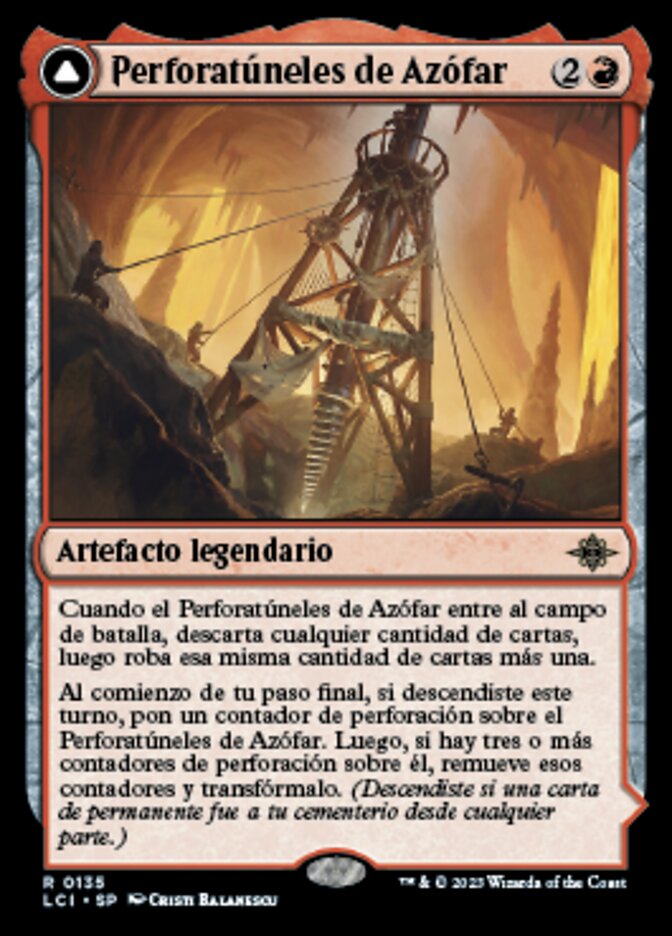

Perforatúneles de Azófar {2}{R}
Artefacto legendario
Cuando el Perforatúneles de Azófar entre al campo de batalla, descarta cualquier cantidad de cartas, luego roba esa misma cantidad de cartas más una.
Al comienzo de tu paso final, si descendiste este turno, pon un contador de perforación sobre el Perforatúneles de Azófar. Luego, si hay tres o más contadores de perforación sobre él, remueve esos contadores y transfórmalo. (Descendiste si una carta de permanente fue a tu cementerio desde cualquier parte.)
Tecutlan, la grieta abrasadora
Tierra legendaria — Cueva
(Se transforma del Perforatúneles de Azófar.)
{T}: Agrega {R}.
Siempre que lances un hechizo de permanente usando maná producido por Tecutlan, la grieta abrasadora, descubre X, donde X es el valor de maná de ese hechizo.
Illustrated by Cristi Balanescu
- Standard
- Legal
- Alchemy
- Legal
- Pioneer
- Legal
- Explorer
- Legal
- Modern
- Legal
- Historic
- Legal
- Legacy
- Legal
- Brawl
- Legal
- Vintage
- Legal
- Timeless
- Legal
- Commander
- Legal
- Pauper
- Not Legal
- Oathbreaker
- Legal
- Penny
- Legal
Toolbox
Buy This Card
Notes and Rules Information for Perforatúneles de Azófar // Tecutlan, la grieta abrasadora:
- Only the English version of a Magic card receives Oracle updates and errata. View this card in English. (Scryfall note)
- You choose how many cards to discard as the first ability of Brass's Tunnel-Grinder resolves. You may choose to discard no cards and just draw a card. (2023-11-10)
- If a permanent spell cast using mana produced by Tecutlan, the Searing Rift has {X} in its mana cost, use the value chosen for X when calculating that spell's mana value. (2023-11-10)
- Tecutlan, the Searing Rift's triggered ability will resolve before the spell that caused it to trigger. (2023-11-10)
- "Discover N" means "Exile cards from the top of your library until you exile a nonland card with mana value N or less. That card is the "discovered" card. You may cast that card without paying its mana cost if the resulting spell's mana value is less than or equal to N. If you don't cast it, put that card into your hand. Put the remaining exiled cards on the bottom of your library in a random order." (2023-11-10)
- A spell's mana value is determined only by its mana cost. Ignore any alternative costs, additional costs, cost increases, or cost reductions. (2023-11-10)
- When you discover, you must exile cards. The only optional part of the ability is whether you cast the exiled card or put it into your hand. (2023-11-10)
- You exile the cards face up. All players will be able to see them. (2023-11-10)
- If you cast a spell "without paying its mana cost", you can't choose to cast it for any alternative costs. You can, however, pay additional costs. If the spell has any mandatory additional costs, you must pay those to cast it. (2023-11-10)
- If the discovered card has {X} in its mana cost, you must choose 0 as the value of X when casting it without paying its mana cost. (2023-11-10)
- If you can't cast the discovered card (perhaps because there are no legal targets for the spell), you'll put it into your hand. (2023-11-10)
- Some spells and abilities that cause you to discover may require targets. If each target chosen is an illegal target as that spell or ability tries to resolve, it won't resolve and you won't discover. (2023-11-10)
- The mana value of a split card is determined by the combined mana cost of its two halves. If discover allows you to cast a split card, you may cast either half (as long as its mana value is less than or equal to the effect's discover value) but not both halves. (2023-11-10)
- If you discover an adventurer card, split card, or modal double-faced card, you might be able to cast that card with either set of characteristics depending on the effect's discover value. For example, if you discover 4 and reveal Galvanic Giant (an adventurer card from Wilds of Eldraine with a mana value of 4), you could cast Galvanic Giant, but not Storm Reading (its Adventure, which has a mana value of 7). If you discover 7 and reveal Galvanic Giant, you could cast either Galvanic Giant or Storm Reading. (2023-11-10)
- Some cards refer to a player who has "descended this turn." This means that a permanent card has been put into that player's graveyard from anywhere this turn. (2023-11-10)
- Some cards refer to the number of times a player descended this turn. Those cards care about the number of permanent cards put into that player's graveyard from anywhere this turn. (2023-11-10)
- In either case, it doesn't matter if those cards are still in that player's graveyard. (2023-11-10)
- A permanent card is an artifact, battle, creature, enchantment, land, or planeswalker card. Tokens are not cards, and while tokens are put into the graveyard before ceasing to exist, that action doesn't count as a player having descended. (2023-11-10)
- Multiple cards have abilities that begin with "At the beginning of your end step, if you descended this turn." These cards don't need to have been under your control at the time you descended. For example, if a permanent card is put into your graveyard during your first main phase and you cast Stalactite Stalker your second main phase, its ability will trigger at the beginning of your end step. (2023-11-10)
- Abilities that begin with "At the beginning of your end step, if you descended this turn" will trigger only once during your end step, no matter how many times you descended this turn. However, if you haven't descended this turn as your end step begins, the ability won't trigger at all. It's not possible to put a permanent card into your graveyard during the end step in time to have the ability trigger. (2023-11-10)